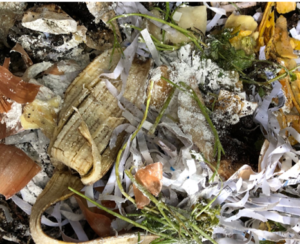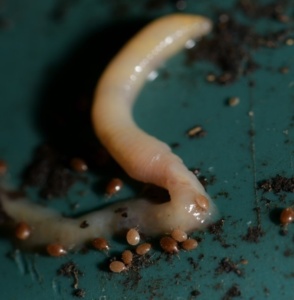Garden Pearls® Lime helps grow healthy worms in my composting system? Yes! It does!
by Gudrun Mahrt, Garden Pearls®

From my earlier blogs you know the pH of soil makes a difference when growing plants.
To improve plant life, we focus on our soil’s tilth, fertility, and other outside impacts such as temperature and moisture. We know it’s wise to improve soil by adding compost. Today, I want to talk about vermicast, compost made by worms.
The compost process recycles organic waste to create a mixture of plant nutrients perfect for fertilizing fields and gardens. Adding Garden Pearls® Lime provides calcium and can influence the pH of the compost pile supporting worms and microbes to create valuable vermicompost.
Perfect vermicompost has a neutral pH of 7. When blended into soils, it works like a pH buffer for your soils. Soil pH of 6.8 to 7 is the ideal condition for most vegetable plants we grow. Adding vermicast to soil also improves soil airing, porosity, and water retention. It holds plant hormones, and an unbelievably huge, and diverse bacterial population.
How does Garden Pearls® Lime help my worm bin?
Garden and kitchen material feed stock is added to a worm bin, but it must be free of harmful hydrogen and other ions that will make the system acidic. Compost piles that do not get turned over become anaerobic and this creates acidic conditions.
Garden Pearls Lime reduces acid conditions; it neutralizes hydrogen, it takes out acidity. This process also adds free calcium ions which are needed by many micro-organisms for proper cell development and nutrient availability. Acid conditions in your compost or worm bin create materials that ferment inside of the worm – where it creates gases and ruptures the worm’s guts! Watch for it – you sometimes see deformed worms. To remedy and control this, add Garden Pearls Lime to all your concentrated organic materials and kitchen scrap. Blend it with high carbon bedding material. I use shredded paper, dried leaves, wood chips, and horse manure.
Microbial and bacterial communities thrive in a worm compost with a pH between 6.5 and 7.4. By adding Garden Pearls Lime to worm bin feed stock, you give them the right pH. Sprinkle Garden Pearls Lime directly over the fresh feed stock, before or after adding it to the bin – that is all you need to do. Using this system, you can control over or under feeding, reduce smells, and prevent potential rodent and pest infestations. Creating this balanced pH condition also limits white worm (enchytraeid) populations which are not harmful but compete for food. This system also prevents an overload of mites that can do great harm to your worms.
Never use hydrated lime or wood ash in your worm bin because it is extremely high in pH and may kill your compost system. If the pH in the feedstock is too high, worms can suffer from protein poisoning. Ammonia, a form of nitrogen gas, is toxic to worms and other soil life – even at low concentrations. This gas can form at pH above 8. You will know when ammonia develops – it starts to smell! Use Garden Pearls Lime instead, it will not increase pH above 7.2.
Garden Pearls® Lime keeps your worm bin system healthy
Many types of mites are naturally found in soil, in manure and other organic materials. With high feed levels, low bedding materials and other imbalances in the worm beds, mites can reach extreme proportions and

stress natural worm development. Another reason to maintain the beds to proper pH because mites thrive in low pH.
How do I know what the pH is in the bin? When do I use Garden Pearls?
You can test pH with a pH meter or a pH indication paper. Simply watch your bins and check for all the potential troubles. A sour smell means just that: harmful acids!
A light dusting of GARDEN PEARLS over each fresh feeding is all that you need. Your worms will thank you with a rich, dark vermicompost. Your plants will thank you with good growth.
References:
CRC – Gudrun Mahrt
Rhonda Sherman,
The Worm Farmers Handbook, North Carolina State University
And information from the Annual NC state vermiculture conference.



